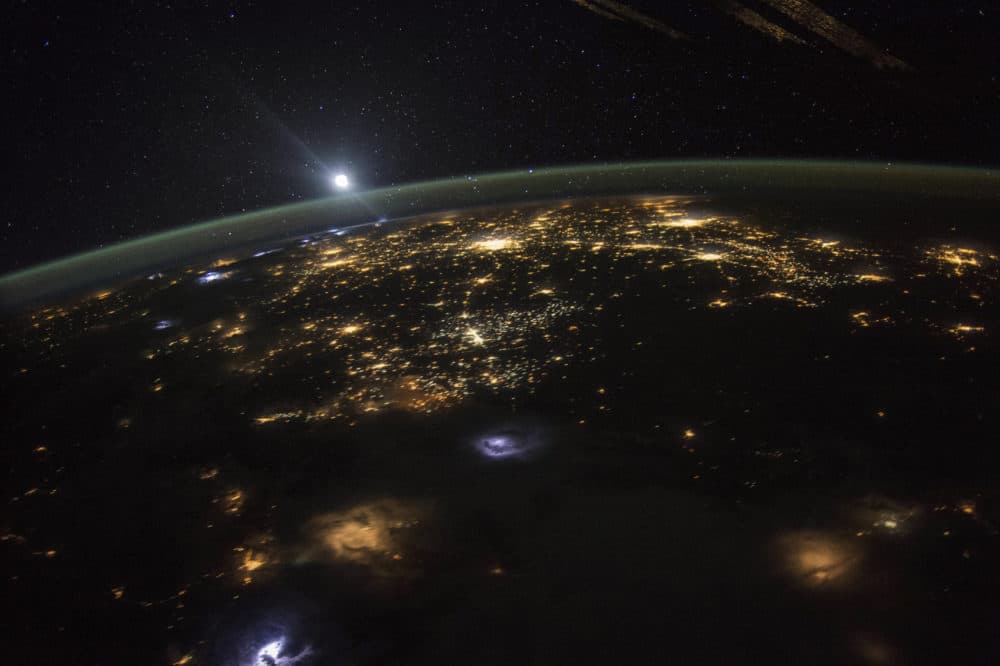Advertisement
Universe, You Don't Look A Day Over 12.5 Billion
Resume
With Meghna Chakrabarti
Are there too many candles on the universe’s birthday cake? New research shows scientists may have overestimated the age by more than a billion years.
Guests
Adam Riess, astrophysicist. Recently published findings that the universe is about a billion years younger than previously believed. Distinguished astronomer at the Space Telescope Science Institute (@stsci). Professor of astronomy and physics at Johns Hopkins University. He won the Nobel Prize in Physics in 2011.
Jo Dunkley, professor of physics and astrophysical sciences at Princeton University. Author of "Our Universe: An Astronomer's Guide." (@j_dunkley)
From The Reading List
NBC News: "The universe may be a billion years younger than we thought. Scientists are scrambling to figure out why." — "We've all lost track of time at one point or another, but astronomers really go all in. Recent studies show they may have overestimated the age of the universe by more than a billion years — a surprising realization that is forcing them to rethink key parts of the scientific story of how we got from the Big Bang to today.
"The lost time is especially vexing because, in a universe full of mysteries, its age has been viewed as one of the few near-certainties. By 2013, the European Planck space telescope's detailed measurements of cosmic radiation seemed to have yielded the final answer: 13.8 billion years old. All that was left to do was to verify that number using independent observations of bright stars in other galaxies.
"Then came an unexpected turn of events.
"A few teams, including one led by Nobel laureate Adam Riess of the Space Telescope Science Institute in Baltimore, set out to make those observations. Instead of confirming Planck's measurements, they started getting a distinctly different result.
"'It was getting to the point where we say, "Wait a second, we're not passing this test — we're failing the test!"' says Riess, co-author of a new paper about the research to be published in Astrophysical Journal."
Associated Press: "New study says universe expanding faster and is younger than we thought" — "The universe is expanding faster than it used to, meaning it’s about a billion years younger than we thought, a new study by a Nobel Prize winner says. And that’s sending a shudder through the world of physics, making astronomers re-think some of their most basic concepts.
"At issue is a number called the Hubble constant, a calculation for how fast the universe is expanding. Some scientists call it the most important number in cosmology, the study of the origin and development of the universe.
"Using NASA’s Hubble Space Telescope, Johns Hopkins University astronomer Adam Riess concluded in this week’s Astrophysical Journal that the figure is 9% higher than the previous calculation, which was based on studying leftovers from the Big Bang.
"The trouble is, Riess and others think both calculations are correct.
"Confused? That’s OK, so are the experts."
The Hub at Johns Hopkins: "The Mystery Of How Fast Our Universe Is Expanding Grows With New Hubble Data" — "New measurements from NASA's Hubble Space Telescope confirm that the universe is expanding about 9 percent faster than expected based on its trajectory seen shortly after the Big Bang, astronomers say.
"The new measurements, published today in Astrophysical Journal, reduce the chances that the disparity is an accident from 1 in 3,000 to only 1 in 100,000 and suggest that new physics may be needed to better understand the cosmos.
"'This is not just two experiments disagreeing,' says Adam Riess, Bloomberg Distinguished Professor of Physics and Astronomy at Johns Hopkins University, Nobel laureate, and the project's leader. 'We are measuring something fundamentally different. One is a measurement of how fast the universe is expanding today, as we see it. The other is a prediction based on the physics of the early universe and on measurements of how fast it ought to be expanding. If these values don't agree, there becomes a very strong likelihood that we're missing something in the cosmological model that connects the two eras.' "
Grace Tatter produced this hour for broadcast.
This program aired on May 22, 2019.